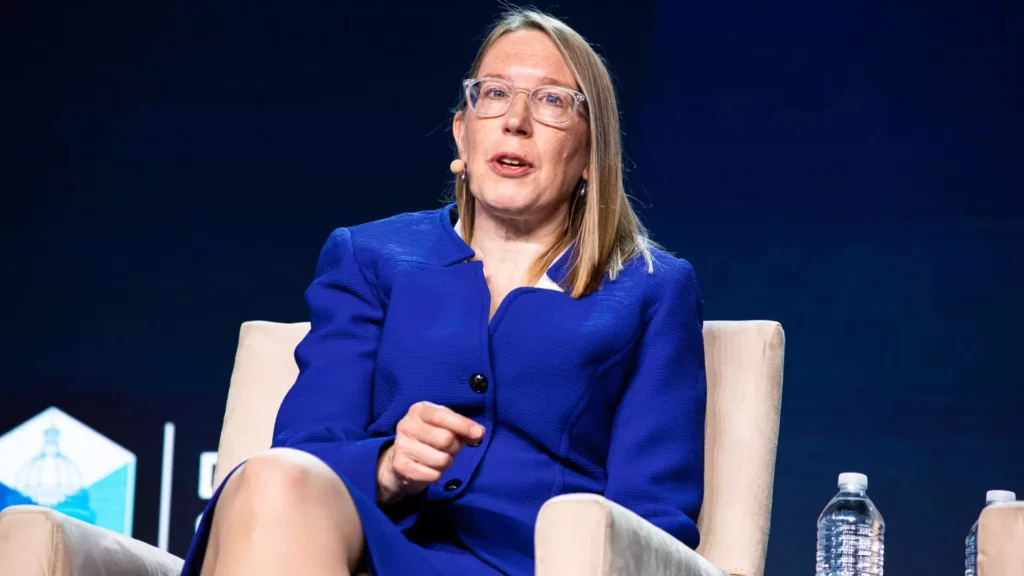The recent decision by the U.S. Securities and Exchange Commission (SEC) to step back from governing meme coins marks a crucial juncture in the chaotic world of cryptocurrency. Hester Peirce, a key figure within the SEC, unequivocally stated that investors should not depend on the agency’s guidelines when it comes to particularly volatile digital assets such as the $TRUMP token. This statement has garnered attention, not just for its implications on digital currency but also for what it reveals about the agency’s evolving relationship with the burgeoning crypto market. The SEC’s retreat is a disconcerting indication that the traditional safety nets investors rely on may be fraying, ushering in a perplexing landscape of speculative trading devoid of consistent oversight.
While the SEC once positioned itself as the gatekeeper of market safety, its recent decisions—mirroring past ambiguities surrounding non-fungible tokens (NFTs)—raise critical questions about investor protection. Peirce’s comments suggest that the current regulatory framework is insufficient and possibly outdated in light of the fast-paced nature of crypto innovation. But is the SEC’s withdrawal an admirable acknowledgment of an evolving marketplace, or does it represent a glaring oversight that leaves individual investors at risk?
The Chaotic Nature of Meme Coins
The $TRUMP token is a prime example of the unpredictability associated with meme cryptocurrencies. It surged to a staggering market capitalization of $15 billion shortly after its launch, bolstered by a social media campaign steeped in Trump’s characteristic bravado. The essentially speculative enthusiasm surrounding this coin catered to a fatally flawed notion that trends and celebrity can translate into genuine financial security. Many investors found themselves enthralled in a whirlwind of excitement, only to witness a dramatic drop in the token’s value mere days later. The emotional highs experienced by investors illustrate a sobering truth: the allure of meme coins is often founded on hype rather than foundational worth.
Trump’s Organization holds a staggering 80% of the $TRUMP token’s supply, raising unsettling questions about the ethicality of such a massive stake in a nascent financial ecosystem. This ownership structure paints a rather unpalatable picture: are individual investors mere pawns in a game controlled by financial juggernauts who exploit emotional trading patterns for profit? The phenomenon of meme coins should serve as a cautionary tale about the latent dangers of investing in novelty, an arena where intrinsic value is consistently overshadowed by the blaring specter of celebrity.
The Regulatory Dilemma and Ethical Concerns
As the SEC retracts its framework for regulating cryptocurrencies, it brings to light larger conversations about governance and ethics within the financial sector. High-profile Democratic figures, including Senator Richard Blumenthal, are not shy in voicing their concerns over Trump’s encroachment into the crypto sphere. The potential for corporate and foreign entities to unearth loopholes in U.S. policies introduces an unsettling scenario wherein power and influence intermingle unchecked in this unregulated domain. The ducking of responsibilities by regulatory bodies only increases the potential for manipulation and exploitation.
The implications of growing connections between political figures and the financial world also cannot be overstated. The unshackling of Binance—an emblematic player in the crypto space—has further blurred the lines between regulatory authority and the enthralled greed of private enterprise. With figures like Changpeng Zhao reopening ties with the Trump network, the crypto universe seems to be reshaping its power dynamics in a manner fraught with sticky ethical dilemmas.
The Need for Robust Regulation
Despite Peirce’s assertions that the SEC is not politically biased but rather struggling to keep pace with rapid changes in the crypto landscape, the challenges it faces are significant. Creating a regulatory framework that ensures investor safety while still encouraging innovation is a delicate balancing act fraught with complications. The SEC’s careful dismantling of overly restrictive regulations represents a step in the right direction, one that hints at a more inclusive ecosystem.
However, the road ahead remains difficult. The underlying philosophy of decentralization, inherent in crypto culture, often runs counter to the notion of oversight and governance. The pressing reality remains: how can regulators enact policies that protect investors without stifling the very innovation that defines crypto? With growing skepticism resonating throughout political and social spheres, there is an urgent demand for transparency and accountabiity.
As individual investors navigate this tumultuous financial landscape, they must remain acutely aware of the inherent risks tied to unregulated investments. With meme coins capable of captivating large audiences overnight, the onus of responsibility rests increasingly on investors. Vigilance will be required as they confront a tempestuous atmosphere peppered with market manipulation and reckless speculation. One cannot help but wonder—which way will the tides turn as these forces continue to collide in an increasingly entwined world of finance, politics, and technology?









Leave a Reply